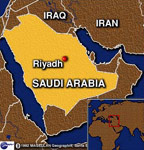 Reuters: In the run-up to its talks with world powers on Monday, Iran extended an olive branch to Gulf Arab states who share Western concerns about its nuclear aspirations.
Reuters: In the run-up to its talks with world powers on Monday, Iran extended an olive branch to Gulf Arab states who share Western concerns about its nuclear aspirations.
By William Maclean, Security Correspondent.
 MANAMA, Dec 6 (Reuters) – In the run-up to its talks with world powers on Monday, Iran extended an olive branch to Gulf Arab states who share Western concerns about its nuclear aspirations.
MANAMA, Dec 6 (Reuters) – In the run-up to its talks with world powers on Monday, Iran extended an olive branch to Gulf Arab states who share Western concerns about its nuclear aspirations.
The initiative fizzled: Iran’s neighbours — global energy suppliers whose shipments would be disrupted in the event of any conflict — reacted with a mixture of suspicion and resignation.
Traditional rivals of Tehran, Gulf Arab states have yet to develop a coherent strategy of their own to counter Iran’s rising influence across the Middle East, and must rely on a U.S. ally they say is not fully attuned to their concerns.
It’s a dilemma Iran did its best to highlight at a Gulf security conference in Bahrain at the weekend.
“The era of the atomic bomb is over,” Iranian Foreign Minister Manoucher Mottaki told Gulf Arab officials.
“What is the use of an atom bomb other than annihilation?”
He said Washington was stoking fears about Tehran that were fuelling a growing regional arms race. Instead, all Gulf countries should cooperate to master their own security.
Six world powers are due to hold their first talks with Iran in more than a year on Monday, hoping the meeting will lead to new negotiations over a nuclear programme the West believes is aimed at making atom bombs. Iran says its aim is peaceful.
Any Iranian hopes Mottaki’s overture would put relations with Gulf Arab neighbours on an even keel proved misplaced.
CONCERNS VOICED “BLUNTLY”
“Iran is our neighbour, but at the same time Iran should be the one to make the first step to dissipate this fear we have of it,” said former Saudi intelligence head Prince Turki al-Faisal.
A Gulf Arab academic who declined to be identified described Mottaki’s remarks as words purely for external consumption. He said they stood in contrast to sentiment among hardliners in Tehran that saw conservative Gulf Arab rulers as stooges of America.
Another academic, United Arab Emirates political scientist AbdulKhaleq Abdulla, said Gulf Arabs tended to see Iran as the Gulf’s “mighty giant” and disliked what they saw as its periodic attempts to impose itself as the policeman of the region.
The Sunni-ruled Gulf states have watched uneasily as the regional clout of Shi’ite Muslim Iran has received an unintended boost from the 2003 U.S.-led war against its former foe Iraq.
Their fears were reflected recently in leaked U.S. diplomatic cables. One notable leak cited Saudi King Abdullah as urging the United States to attack Iran’s nuclear installations. He was reported to have advised Washington to “cut off the head of the snake” while there was still time.
General James Mattis, the Commander of U.S. Central Command, told the Manama Dialogue conference organised by UK-based think tank the International Institute for Strategic Studies that Gulf Arabs were direct about their concerns.
“In private meetings, in public discourse, I have had explained to me very bluntly here in the region the concerns of very responsible leaders … they are very grim with me.”
Not before time, the West is listening more closely to Gulf Arab views on Iran’s nuclear goals, Gulf Arab delegates said.
SECURITY “PENALTY”
But Gulf Arabs’ support for Western policy on Iran has a big reservation: They say there cannot be genuine peace in the Middle East until Israel abandons nuclear weapons, a view shared by other Arab states as well as Iran itself.
Arab officials argue that that step would remove the accusation of U.S. double standards they say Iran uses to raise support among its people for its nuclear policy.
Israel, widely believed to hold the Middle East’s only nuclear arsenal, says it would only agree to a proposal for Middle East zone free of weapons of mass destruction if there was a comprehensive Middle East peace.
Israel has never confirmed or denied having atomic bombs, under a policy of ambiguity to deter its Arab and Islamic foes.
Gulf Arabs are also worried that al Qaeda and similar radical groups are exploiting Arab anger about the Israeli-Palestinian dispute, a message underlined strongly by King Abdullah of Jordan in a speech to the Bahrain conference.
On this, Mattis signalled a measure of agreement, saying Israel-Palestine was “the core issue … it underlies everything that I deal with, frankly, in my daily job in this region.
“There is a penalty, a security penalty, if the Middle East peace process stagnates, and nobody is more aware of that than those of us who wear uniforms in this room.” (Reporting by William Maclean, Editing by Samia Nakhoul)


